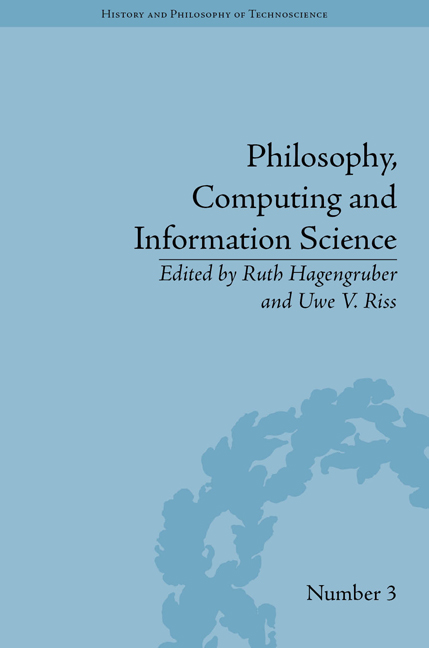Book contents
- Frontmatter
- CONTENTS
- List of Contributors
- List of Figures and Tables
- Introduction: Philosophy's Relevance in Computing and Information Science
- Part I Philosophy of Computing and Information
- Part II Complexity and System Theory
- Part III Ontology
- 7 The Relevance of Philosophical Ontology to Information and Computer Science
- 8 Ontology, its Origins and its Meaning in Information Science
- 9 Smart Questions: Steps towards an Ontology of Questions and Answers
- Part IV Knowledge Representation
- Part V Action Theory
- Part VI Info-Computationalism
- Part VII Ethics
- Notes
- Index
9 - Smart Questions: Steps towards an Ontology of Questions and Answers
from Part III - Ontology
- Frontmatter
- CONTENTS
- List of Contributors
- List of Figures and Tables
- Introduction: Philosophy's Relevance in Computing and Information Science
- Part I Philosophy of Computing and Information
- Part II Complexity and System Theory
- Part III Ontology
- 7 The Relevance of Philosophical Ontology to Information and Computer Science
- 8 Ontology, its Origins and its Meaning in Information Science
- 9 Smart Questions: Steps towards an Ontology of Questions and Answers
- Part IV Knowledge Representation
- Part V Action Theory
- Part VI Info-Computationalism
- Part VII Ethics
- Notes
- Index
Summary
Introduction
The present essay is based on research funded by the German Ministry of Economics and Technology and carried out by the Munich School of Philosophy (Prof. Godehard Brüntrup) in cooperation with the IT company Comelio GmbH. It is concerned with setting up the philosophical framework for a systematic, hierarchical and categorical account of questions and answers in order to use this framework as an ontology for software engineers who create a tool for intelligent questionnaire design.
In recent years, there has been considerable interest in programming software that enables users to create and carry out their own surveys. Considering the, to say the least, vast amount of areas of applications these software tools try to cover, it is surprising that most of the existing tools lack a systematic approach to what questions and answers really are and in what kind of systematic hierarchical relations different types of questions stand to each other. The theoretical background to this essay is inspired Barry Smith's theory of regional ontologies.
The notion of ontology used in this essay can be defined by the following characteristics: (1) The basic notions of the ontology should be defined in a manner that excludes equivocations of any kind. They should also be presented in a way that allows for an easy translation into a semi-formal language, in order to secure easy applicability for software engineers. (2) The hierarchical structure of the ontology should be that of an arbor porphyriana.
Information
- Type
- Chapter
- Information
- Philosophy, Computing and Information Science , pp. 91 - 98Publisher: Pickering & ChattoFirst published in: 2014
